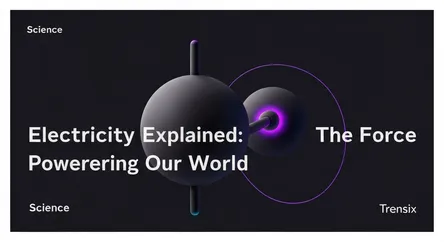Science
Electricity Explained: The Force Powering Our World

An essential overview of electricity, from the flow of electrons to its critical role in modern society and the growing demands on our power grids.
What is it?
Electricity is a fundamental form of energy resulting from the presence and flow of electric charge. At a microscopic level, it is the movement of electrons from one atom to another. This flow, known as electric current, happens when there is a potential difference, or voltage, between two points, pushing the electrons through a conductive material. Electricity is a secondary energy source, meaning it's generated by converting primary sources like fossil fuels, nuclear energy, or renewables such as solar and wind power. It can exist as static electricity, an accumulation of charge on a surface, or more commonly as dynamic electricity, which flows through circuits to power devices.
Why is it trending?
Electricity is consistently a trending topic due to its central role in the energy transition and technological advancement. Global electricity demand is surging, driven by the electrification of heating and transport, and the increasing number of electric vehicles. Furthermore, the rapid growth of artificial intelligence and data centers is creating an unprecedented new demand for power. This has put a spotlight on the need for smarter, more resilient power grids (smart grids) and the integration of renewable energy sources. Innovations in how electricity is generated, stored, and distributed are critical topics of discussion as the world aims to meet rising energy needs sustainably.
How does it affect people?
Electricity is indispensable to modern life, powering nearly every aspect of society, from homes and transportation to industry and life-saving medical equipment. It provides light, heat, and the ability to run the digital technologies that connect our world. However, electricity can also be dangerous. Direct contact with electric current can cause severe injury or death. An electric shock can result in deep burns, nerve damage, and can disrupt the natural electrical signals that control the heart and muscles, potentially causing cardiac arrest or involuntary muscle contractions. Therefore, while electricity is a vital tool for human progress, safety and awareness are crucial.